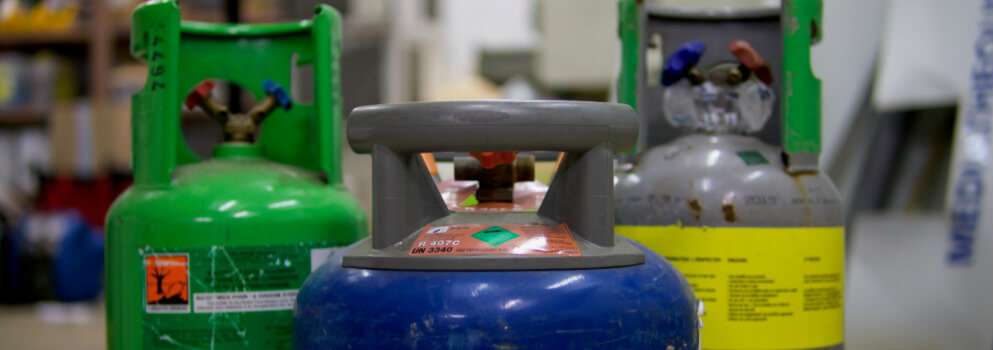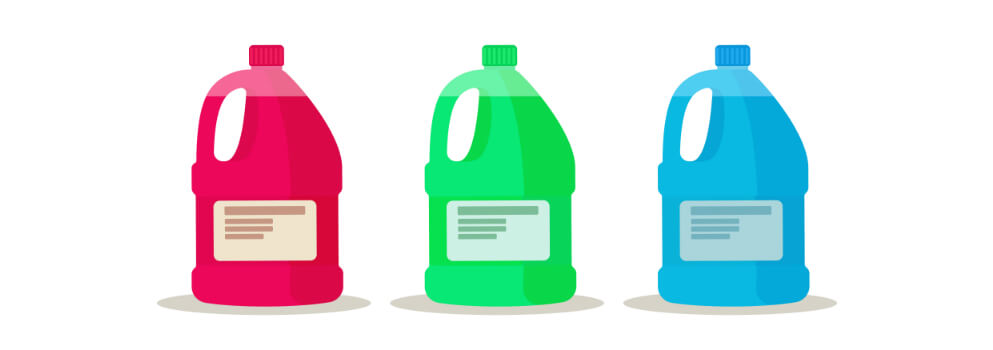
Common Refrigerant Types Used in Chillers

All conventional chiller systems have refrigeration units which alter the temperature of their coolants. These units contain circulating chemical substances with alterable states that facilitate the heat exchange effects they exert on a given industrial process.
The refrigerants used in these chiller systems are gradually being replaced by newer, more environment-friendly alternatives due to adverse effects of older refrigerant types on the ozone layer and global warming.
Properties of a Refrigerant
Currently available refrigerants have several advantages and drawbacks when compared to one another. It is important to note that no single refrigerant used in chillers meets all the criteria of the perfect chemical freezing mixture.
Theoretically speaking, the ideal chiller refrigerant type will possess all the following properties. Note that many of these criteria are dependent on your unique application.
Appropriate Thermodynamic Properties
An ideal refrigerant should possess the following thermal characteristics:
- Boiling point just under the targeted coolant temperature
- Elevated heat of vaporization
- Moderate density in a liquefied form
- High density when in a gaseous state
- High critical temperature
Noncorrosive
Refrigerants which won’t corrode the mechanical components of the refrigeration systems they circulate through are highly desirable as they will reduce the cost of industrial chiller maintenance.
High Safety Rating
The best refrigerant should be non-toxic, and non-flammable. Additionally, it should exert minimal adverse effects on the ozone layer and not add to the burden of climate change.

11 Common Types of Chiller Refrigerant
So, what refrigerant type is used in chillers most often? Deciding on the type of refrigerant to use in a chiller unit, depends on industrial preferences, cost considerations and need for compliance with industrial, occupational health and environmental regulations including global warming potential (GWP).
Outlined below are 11 of the most common refrigerants used in chiller plants.
1. Water
Utilizing water as a refrigerant is a low-cost solution which is completely non-toxic, easily accessible and environment-friendly. There are however significant drawbacks to choosing a water-based refrigerant including:
- Ambient environmental temperatures will easily affect the efficiency of the cooling process
- Water will cause corrosion, damage refrigerant components and drive up maintenance costs more quickly than some substitutes
Note: Water is primarily used in absorption chillers and is not common in vapor-compression systems
2. R134A HFC
This is a hydrofluorocarbon (HFC) and haloalkane refrigerant commonly known as norflurane or Freon 134A. As a refrigerant, it possesses completely stable thermal characteristics, has low toxicity, and is non-corrosive and non-combustible. It is widely used in car air-conditioning units as well as industrial chiller units.
Additionally, R134A HFC has minimal ozone depletion potential but has a high GWP. It is currently being phased down under international environmental agreements such as the Kigali Amendment to the Montreal Protocol.
3. R744 CO2
Using carbon dioxide CO2 as a refrigerant is advantageous as it is non-flammable and not toxic. Drawbacks are the fact that a large system is required to handle the gas and leaks pose a significant security risk. Also, the installation and maintenance costs for R744 CO2 refrigerant can be high.
Carbon dioxide systems also operate at very high pressures, requiring specialized components.
4. R717 Ammonia
Ammonia (R717) is a type of refrigerant that belongs to the class of halogen-free chemicals. This is the most popular refrigerant used in chiller plants. It has the highest heat absorption rating which makes it ideal for use in smaller, portable chiller units negating the need for large cooling plants.
Other benefits of using ammonia as chiller refrigerant are its stable thermal properties. However, it should be handled with care as it has a toxic effect on humans.
Note: Ammonia is widely used in large-scale industrial refrigeration systems but is generally avoided in small systems due to its toxicity and flammability.
5. HCFC – Hydrochlorofluorocarbons
These are a group of refrigerants which are composed of hydrochlorofluorocarbon compounds. They have high GWP and are highly toxic. Examples of the different types of chiller refrigerant in this group include R2, R123, R124, and R151.
Most HCFCs, especially R22, are being phased out globally due to their ozone depletion potential under the Montreal Protocol.
6. HCS
Hydrocarbons are another refrigerant used in chillers for both domestic and industrial/commercial refrigeration systems. Commonly available variants of refrigerant hydrocarbons are R600A (isobutene) and R290 (propane).
These types of refrigerants are highly flammable, so careful specialized installation is required. Propane is known to have no ozone layer depletion potential, so it is suitable for use in environment-friendly industrial chillers.
Despite their flammability, hydrocarbons are increasingly used in small systems for their excellent thermodynamic performance and low environmental impact.
7. R407C
The combination of the hydrofluorocarbons difluoromethane (R32), pentafluoroeethane (R125) and 1, 1, 1, 2- tetrafluoroethane (R134A) will provide heat, reduce flammability and decrease pressure respectively. This refrigerant is proposed as the most suitable replacement for R-22 refrigerant systems which will be phased out by 2020.
R407C has no ozone depletion potential but still possesses a moderate GWP.
8. R404A
If a low to medium temperature refrigerant is required for a cooling process, then R404A should be considered. This is a hydrocarbon blend which can be used in various commercial settings such as supermarkets and cold rooms.
Due to its high GWP, R404A is being phased down under current environmental regulations.
9. R410A
For general purpose air-conditioning, R410A is a zeotropic mixture of hydrofluorocarbons which can be employed. It does not have harmful effects on the ozone layer and is becoming more popular as R22 refrigerants are being phased out.

However, R410A has a relatively high GWP and is also being replaced by lower-GWP alternatives such as R32 and R454B.
10. R448A
This is a non-flammable hydrofluorocarbon blend intended to replace R22 as well as R404A in domestic and commercial refrigeration systems. It is toxic and requires careful handling, installation, and storage.
R448A has a lower GWP than R404A and is part of the effort to reduce overall greenhouse gas emissions in refrigeration.
11. R449A
R449A is another hydrofluorocarbon blend similar in composition to R448A. It is intended as a replacement R404A and R507A refrigerants in low to moderate temperature applications.
A major advantage of R449A is that it can be easily retrofitted in old chiller systems or installed in newer models. An additional benefit is its environment-friendly nature with a low GWP.
Note: While R449A is less harmful than older HFCs, it is still being evaluated alongside newer, ultra-low GWP refrigerants like hydrofluoroolefins (HFOs).
Trust Cold Shot for All Your Process Chilling Needs
For more than three decades, the industrial chiller manufacturers at Cold Shot Chillers have been dedicated to providing the very best cooling solutions for a wide range of industrial processes.
Cold Shot Chillers offers a range of water-cooled and air-cooled chiller systems suited to a wide range of industrial and commercial applications.
For more information about how we can meet your process cooling needs, please contact us online today!